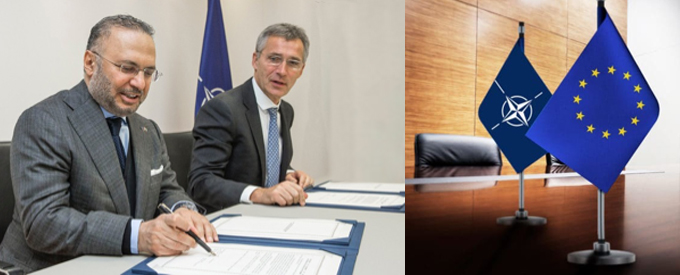2021-07-04
The UAE and NATO Centers of Excellence: Seizing Opportunities for Mutual Benefit
Following the 911 attacks on the United States, the member states of the transatlantic NATO alliance met in Prague in 2002 to chart a transformational response to the new threat environment. A cornerstone was the establishment of Allied Command Transformation (ACT) based in Norfolk, U.S.. This strategic command spearheads the interoperability of forces, training and education, new concept development and experimentation, and lessons learned.
.jpg)
One notable outgrowth has been the creation of 26 ACT-accredited Centres of Excellence (COEs) specialising in a particular warfare or security domain ranging from Command and Control and Combined Joint Operations from the Sea, through Energy Security and Defense Against Terrorism, to Military Medicine and Joint Chemical, Biological, Radiological and Nuclear (CBRN) Defense. Under the sponsorship of a host member state and cluster of supporting nations, a COE sits outside the formal NATO Command Structure to be a kind of voluntary transformational hub or community of best practice in its area of specialization. Openness to NATO partners has been a COE operating tenet from the beginning. As the current ACT Commander, French General André Lanata, remarked in 2020, “due to their unique status, they also provided a bridge with non-NATO organisations and entities, thus expanding the Alliance understanding of the international medical and technological environments. NATO COEs are centerpieces of our network of expertise and have proven to be a successful model for effective multinational solutions.” The UAE is included in this bridge-building.
UAE-NATO COE Exchange
As a valued NATO partner since 2004 in the context of the Istanbul Cooperation Initiative (ICI) framework (which also includes Bahrain, Qatar and Kuwait as active participants), the UAE enjoys access to the extensive COE network for mutual exchange. Building on previous interchange, the UAE and NATO signed an Individual Partnership Cooperation Programme (IPCP) agreement in 2016. The accord, signed by HE Dr. Anwar Mohammed Gargash, UAE Minister of State for Foreign Affairs, and Jens Stoltenberg, NATO Secretary General, specifically advocated for closer bilateral cooperation in areas such as education and training and the interoperability of forces.
It should come as no surprise, therefore, that the COEs have played their part in forging closer UAE-NATO ties. The following three examples are illustrative:
1) UAE experts’ contribution to the delivery of an advanced training course for first responders to CBRN incidents at the NATO Joint CBRN Defense COE in June 2013, working with Egyptian and Jordanian NATO partners;
2) UAE participation with Energy Security COE experts in the Energy Infrastructure Protection Course at the NATO-ICI Regional Center in Kuwait in February 2018;
3) Official visit to the Riga-based Strategic Communications COE by HE Mrs Hanan AL Aleeli, UAE Ambassador to NATO member state Latvia, in June 2018.
Future Prospects
Looking ahead, two avenues to further advance the UAE’s COE engagement may be identified.
Contributing Partner
First, some NATO partner nations have moved beyond periodic engagements with the established COEs to formal, sustained contributions in human and financial resources in warfare areas of particular importance to their nations. Cases in point include: Cooperative Cyber Defense COE – Austria, Finland, Switzerland, Sweden; Counter Improvised Explosive Device COE – Sweden; Energy Security COE – Georgia, Finland; Strategic Communications COE – Finland, Sweden; Mountain Warfare and Joint CBRN COEs – Austria. Should the UAE similarly identify a COE particularly aligned to national priorities and warranting closer involvement, a written Technical Arrangement (TA) would be negotiated with ACT’s Transformation Network Branch (TNB).
Gulf Cooperation Council COEs
Second, some analysts have suggested that the proven NATO COE model could serve as a template for other international organisations to emulate. This perspective emphasises NATO’s life-cycle process of establishing, accrediting and evaluating a COE that the alliance has developed over two decades. Considering the 2021 Gulf Cooperation Council (GCC) Summit’s renewed emphasis on the military integration of member countries to address emergent challenges, the COE construct would appear relevant and aligned with the intent of Article 5 of the Joint Defence Agreement. A COE’s flexible and voluntary participation, coupled with the opportunities it presents for tailored specialisation, might prove an attractive way forward. Given regional geography and Information Age concerns, it is not difficult to envision how the latter might include desert warfare or AI implications for warfighting, for example. Just as NATO partner Finland was instrumental in spearheading the creation of the European Center of Excellence for Countering Hybrid Threats, NATO’s ICI partners could conceivably adopt a similar approach in a GCC context when the time is ripe.
Conclusion
For almost two decades, NATO and its partners have benefited from an ever-widening and deepening network of Centers of Excellence to meet the challenges of the evolving international security environment. They are the epitome of the oft-heard mantra of armed forces that “transformation is a journey, not a destination.” The UAE, a longstanding NATO partner, has been an active participant and the future offers prospects for continued beneficial engagement alongside other Gulf allies.
References :
- Allied Command Transformation 2021. NATO-Accredited Centers of Excellence 2021 Catalogue. Norfolk, USA: NATO.
- Khatib, D 2017. “The UAE’s Relations with NATO”, H. Akbulut (ed), NATO, Cooperative Security, and the Middle East – Status and Prospects, Vienna: Austrian Institute for International Affairs.
- Roberts, G 2014. “NATO’s Center of Excellence: A Key Enabler in Transforming NATO to Address 21st Century Security Challenges”, Working Paper (8 October), Stanley Foundation, the Center for Strategic and International Studies, and the Vienna Center for Disarmament and Nonproliferation.


.jpg)
No Comments